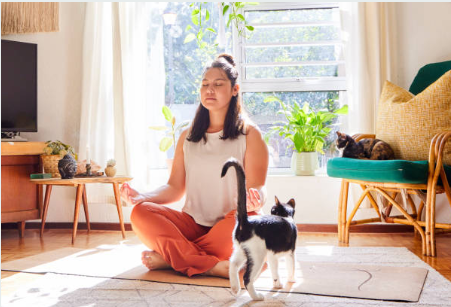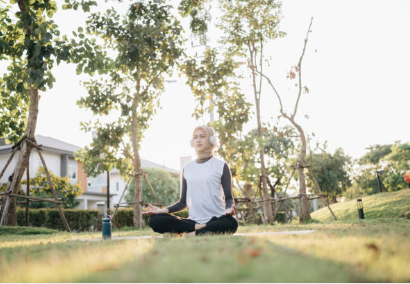What is the Best Self-Care?
Taking care of yourself is an important part of your overall wellness, so it’s essential to understand how to make sure that you’re taking the best care of yourself. You can take care of yourself by making sure that you have time for activities that you enjoy, including things like yoga and meditation. In addition, it’s important to make sure that you’re focusing on your emotions and developing a plan to deal with them.

Selfpause Affirmation App
Download the app to get 1,000’s of affirmation meditations and everything you need to write, record and listen to your own.
Meditation

Using meditation as a self care technique can have many benefits. It can help you to relax, improve your physical health, and boost your creativity. It can also help you to better manage stress.
The first step to using meditation as a self care technique is to set a schedule. Set aside some time every day to meditate. This can be a short five-minute session, or a longer session that is lasting ten minutes or more.
After choosing a time and place, find a comfortable sitting position. You might want to sit on the floor or sit cross-legged. Make sure your spine is straight, and your head is up.
You might want to focus on your breathing. Breathe deeply into your belly. Once you feel your belly expand, slowly exhale.
You may also want to take notes about your feelings. You can also focus on a specific part of your body, like your head or your eyes. As you feel different sensations, note them without judgment.
Meditation may not always be easy. You might feel uncomfortable, or experience troubling thoughts. If this happens, don’t worry. Just focus on the sensations. If you find it difficult to meditate, try a different method.
Some people find that meditating can help them to cope with stress, depression, and panic. Meditation can also help you to relax, increase your confidence, and increase your self-love. It can also boost your creativity and increase your energy.
Gratitude

Gratitude is the best self care practice. It can help you find happiness, improve your physical and mental health, and even increase your self confidence. There are many ways to practice gratitude, but one of the best is by keeping a gratitude journal.
The goal of a gratitude journal is to consciously reflect on your life. By writing about what you are grateful for, you can relieve stress and increase your confidence. It also trains your brain to search for things to be thankful for.
Keeping a gratitude journal is not only a great way to improve your mental health, but it can also help you manifest better experiences throughout the day. It’s also a great way to strengthen social ties. Gratitude journals have become very popular in recent years.
The best gratitude journal should provide you with specific writing exercises, helpful hints, and quotes. Choose one that you’ll enjoy writing in. Also make sure it has some sort of reflection section so you can pause and reflect on your day.
If you’re not into writing, you can also try verbalizing your gratitude. Some people have found that expressing gratitude out loud to others helps them be more thankful. You can also tie your gratitude to a daily activity, such as brushing your teeth. Having gratitude can help you wake up in the morning and improve your physical health.
Yoga

Practicing yoga is an excellent way to relieve stress, increase flexibility, improve strength, and improve balance. The practice also helps improve your overall physical and mental health.
Yoga is an ancient practice, and there are many different styles. You can find a style that works for you. You can also find online yoga workouts that will inspire you to try new things and change your lifestyle.
One of the reasons why yoga is a great self care method is that it helps you develop a sense of connection to your body. This can help you appreciate and love your body, as well as be more accepting of yourself. Practicing yoga also helps you develop a sense of mindfulness.
Yoga can help you manage your stress, anxiety, depression, and menopause. Practicing yoga can help you reduce symptoms of chronic conditions, such as asthma, and relieve the symptoms of mental health conditions. It can also help you relieve symptoms of emotional exhaustion and depersonalization.
Yoga can also help improve muscle healing. It improves flexibility, range of motion, muscle oxygenation, and overall strength. A good yoga practice can also improve mental fortitude and adaptability.
You should find a yoga style that works for you, and schedule it during a convenient time. You should also make sure to keep your practice consistent. It can be difficult to keep a schedule, but if you start out small, you can build up to your practice.
Taking time for activities you enjoy

Taking time to do the right things is vital for a healthy and productive life. The best way to accomplish this is by setting goals. You may be able to accomplish this by setting small goals. Using these smaller goals to your advantage will help you accomplish the bigger goal of a happy, healthy you. Using these small goals as the blueprint to your life will set you on the road to success. These small goals will also help you avoid burn out. This is especially true if you are dealing with a high stress work environment. For example, working in an office for hours on end may be a recipe for disaster. This is why it is a good idea to have a list of go-to-here places for when things get hectic. After all, if you can’t find the time to leave your desk, your productivity will suffer.
You may have a long commute, but that should not be a deterrent. To that end, it is time to set up a schedule for yourself and your family. Doing this will allow you to make time for the important things in life, like spending time with family and friends. You may even find that you re-engage with the important people you have neglected in the past. You may even find that you have a new found passion for life in general.
Developing a plan

Developing a plan for self care is an important part of maintaining well-being. It helps you to identify your needs and the resources available to meet them. It also helps to identify strategies to achieve your goals. A well-developed self-care plan also serves as a reminder to stay on track and avoid making excuses.
The best way to develop a plan for self care is to make sure you include all aspects of your life. This means attending to your emotional, spiritual, and physical needs. In addition, it is important to schedule activities in advance. This reduces the effort required to come up with new self-care ideas. Moreover, a well-planned self-care routine also helps to establish a regular routine. This is especially important in the workplace, where the demands on your time are often greater than the time you have to devote to it.
The best self care plan is the one that works for you. To achieve this, you need to figure out what you like doing and what makes you happy. You can do this by talking to your friends and family or engaging in outdoor activities. You can also take up yoga classes, try playing games on your tablet, or attend religious services.
Developing a plan for self care may seem a bit daunting, but the process is fairly simple. You will be amazed by how much better you will feel once you have it in place.
Emotional self-care

Having a healthy attitude toward your emotions will help you cope with the trials of life. You’ll be better equipped to handle them, and you’ll also feel better overall. Emotional self-care is one of the most important aspects of self-care. Here are some tips to make sure you’re doing it well.
If you’re having a hard time, consider talking with a counselor. You can also try journaling to help you process your emotions. You can also join a local support group to get support and guidance.
It can be difficult to say no to people, but it’s essential to your emotional well-being. When you’re stressed out, you’re more likely to make bad decisions. This can lead to physical consequences. You may also feel burned out and drained.
One of the most important aspects of emotional self-care is positive self-talk. Positive self-talk is not the easiest thing to do, but it can be beneficial. This is especially true if you’re a natural empath.
When you’re feeling sad, angry or frustrated, it’s important to recognize your triggers. By recognizing your triggers, you can avoid letting them control you. It’s also important to set boundaries.
If you’re struggling with anxiety, it’s important to get help. You may want to take a short break from social media and other distractions to clear your mind. You can also join a local support or hiking group.
Our Top FAQ's
Some examples of self-care activities that can improve physical and mental well-being include: getting enough sleep, exercising regularly, eating a healthy diet, taking breaks from screens and technology, practicing mindfulness or meditation, spending time in nature, and engaging in hobbies or activities that bring joy and relaxation.
Determining what self-care practices work best for an individual can be a process of trial and error. It may be helpful to consider what types of activities and behaviors help you feel most rested, energized, and balanced, and then try incorporating those into your routine. It can also be helpful to seek guidance from a mental health professional or trusted friend or family member.
Incorporating self-care into a daily routine can be as simple as setting aside a few minutes each day to do something that nourishes your body, mind, and spirit. It may be helpful to schedule self-care activities in advance and make them a non-negotiable part of your routine, such as setting aside time for meditation or exercise in the morning or taking a break from screens in the evening.
Some common obstacles or challenges to practicing self-care include lack of time, lack of energy, and difficulty prioritizing self-care activities. To overcome these challenges, it may be helpful to set boundaries with work and other commitments, delegate tasks or responsibilities when possible, and find ways to make self-care activities more convenient and efficient. For example, you might try finding a short and easy-to-follow mindfulness or exercise routine that fits into your schedule, or you might try finding healthy and convenient meal options that support your self-care goals.
Self-care can be beneficial in managing stress, anxiety, and other mental health concerns by helping to reduce feelings of overwhelm and improve overall well-being. Engaging in self-care activities can help to calm the mind and body, improve mood, and provide a sense of control and self-compassion. For individuals struggling with mental health concerns, self-care can be an important part of a holistic treatment plan, along with therapy and medication as needed.
